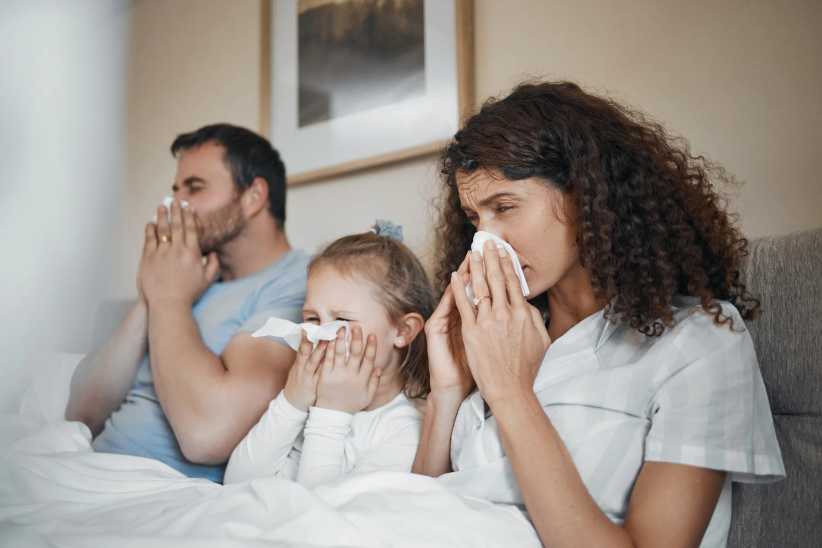November marks the 36th annual Great American Smokeout, and you know what that means — time for a healthy change. But if you’ve tried kicking the habit unsuccessfully before, maybe realizing just how much you’re hurting your kids by not quitting will be just the encouragement you need.
 I was recently flipping through a magazine and came across a photo of Desi Arnaz, cigarette in hand, standing next to a pregnant Lucille Ball. It was well known that the couple were regular smokers; Phillip Morris even sponsored their show. Just half a century ago it seemed like just about everyone smoked—it was trendy and glamorous, a cultural centerpiece. And smoking around your kids, or your pregnant wife? Commonplace. Just check out any episode of Mad Men, for goodness sake. We weren’t aware of the serious health risks smoking posed, and tobacco companies had no restrictions on where they could advertise.
I was recently flipping through a magazine and came across a photo of Desi Arnaz, cigarette in hand, standing next to a pregnant Lucille Ball. It was well known that the couple were regular smokers; Phillip Morris even sponsored their show. Just half a century ago it seemed like just about everyone smoked—it was trendy and glamorous, a cultural centerpiece. And smoking around your kids, or your pregnant wife? Commonplace. Just check out any episode of Mad Men, for goodness sake. We weren’t aware of the serious health risks smoking posed, and tobacco companies had no restrictions on where they could advertise.
In the late ’90s, some of that changed with the multi-state settlement agreement between the states and big tobacco. Regulations on advertising and marketing were imposed on tobacco companies and funding for tobacco prevention programs were made available. Yet more than a decade later, there is still a lot of progress to be made.
Risky Business
Although we know so much more about the risks, smoking is still a health crisis as the single most preventable cause of death in the United States. According to the Centers for Disease Control and Prevention, tobacco use is responsible for one in 5 deaths each year—more than HIV, alcohol and illegal drug use, motor vehicle injuries, suicide, and murder-related deaths combined. Smoking is the cause of several types of cancers, stroke, lung diseases, vision loss and blindness, and heart disease, the leading cause of death in the U.S. In women, smoking has been linked to infertility, preterm delivery, stillbirth, low birth weight, and SIDS, according to the U.S. Department of Health and Human Services. And smokers are not immune to a host of other unpleasant effects such as gum disease, stained teeth and hands, bad breath, wrinkles, and the foul smell of smoke.
According to the U.S. Surgeon General, parents who smoke put their kids at risk for lower respiratory infections like bronchitis and pneumonia, ear infections, and more frequent and severe asthma attacks. A recent poll in Parenting magazine found that 78 percent of moms agree that it should be against the law for parents to smoke at home or in their cars. This could become a reality if the New York Senate passes a bill which would prohibit smoking in a car where a child 14 years old and younger is present (at press time the bill had recently been amended but not yet passed; smoking is already outlawed in Rockland County in vehicles with passengers under 18; and Nassau County is mulling a similar ban).
For kids, whose brains are rapidly developing during the teen years, signs of addiction show up quickly, even within a day of first lighting up, according to a 2007 study in the Archives of Pediatric and Adolescent Medicine. “Nicotine is a very highly addicting substance—it’s just as addicting as narcotics. So the chemistry of the brain changes almost immediately when you smoke a cigarette,” indicates Norman H. Edelman, M.D, chief medical officer of the American Lung Association. “They start developing the long-term health risks. Almost all of these health risks take a long time to develop so you don’t see them during the teenage period, but they’re there—and some of them are irreversible,” he says.
Almost 80 percent of adult smokers light up before their 18th birthdays, due in part to the tobacco companies who spend more than $12 billion on advertising and marketing each year to target them. In fact, a study by the Journal of the National Cancer Institute found that teens are more likely to be influenced by marketing strategies than by peer pressure. “Tobacco companies have known for years that kids are more vulnerable to their advertising and marketing, and that tobacco use is often the first act of rebellion,” says Danny McGoldrick, vice president of research at the Campaign for Tobacco-Free Kids.
One in 5 adults still lights up despite the serious health risks, the expense, and the inconvenience. In 2009, the federal government started to make sweeping changes when President Obama signed the Family Smoking Prevention and Tobacco Control Act. The legislation now allows the FDA to further regulate big tobacco, including specific provisions that control cigarette marketing to kids. And earlier this year, the City Council in Manhattan approved a ban to prohibit smoking in parks and beaches. “It’s a sign of the continuing de-normalization of tobacco in our society,” says Russ Sciandra, director of advocacy for the American Cancer Society in New York State. “It’s simply not socially acceptable in more and more places and in more and more social groups.” Yet because nicotine is so addictive, cigarettes are so easy to get, and tobacco companies are strategic about their marketing tactics, Sciandra says it’s easy to start—and so much more difficult to stop.
Absolutely—Quitting Is Tough
John Puglisi, a divorced dad, remembers exactly when he quit: January 29, 2009 at 11pm. It was the night before he was to appear on The Today Show for a quit-smoking series the program produced in collaboration with the American Legacy Foundation, a nonprofit organization dedicated to tobacco prevention and cessation. John was given a choice of methods, and although he had used the prescription drug Chantix in the past with moderate success, he was confident it would work this time if he planned for the side effects. “I didn’t want to disappoint the kids again,” he says of his daughters, ages 10 and 16. “And I was going to be pretty much quitting in front of millions of people and everyone that I know and like,” says the insurance salesperson who works in Manhattan.
John says that his pack-a-day habit of nearly 18 years was taking over his life. “I was freaking out; I needed to have one,” he recalls of the time when he rushed, short of breath, to the smoking area in Dulles International Airport in between his layover for a quick smoke. “It was really getting to be a burden.”
John made nearly 10 unsuccessful attempts to quit, using the patch, Chantix, Wellbutrin, and even trying cold turkey. After a series of relationships where his smoking interfered, and a failed attempt to quit that left his youngest daughter feeling let down, he realized it was time for a change.
After quitting, John says he also had to plan for situations where he might be tempted-like at his company’s national sales conference at Mohegan Sun, where he avoided the many smoking areas. And instead of entertaining clients in bars, he opted for smoke-free environments like the theater instead.
Kicking the habit has improved John’s health. He hasn’t had bronchitis or an ear infection, and colds now run their normal course, something he frequently dealt with over longer periods before. “I feel physically cleaner because I don’t have that glaze of smoke on my skin.” He also doesn’t have to separate himself from his daughters to smoke, and he’s able to play with them longer. “I’m their dad and I fulfilled my role as a role model,” he says.
Committing for the Long Haul
Although 70 percent of smokers want to quit, it takes about 8-10 attempts to finally kick the habit, making it difficult to find long-term success. Those who are able to permanently quit do so because they have a plan-not only for how to quit, but how to handle the triggers that cause them to reach for a cigarette in the first place.
Quitting cold turkey can work if you smoke less than 10 cigarettes a day but it’s not the most effective method. Nicotine replacement therapies, which include the patch, gum, lozenges, nasal spray or inhaler, as well as drugs like Wellbutrin, Zyban, and Chantix, used either alone or in combination, have been shown to double a person’s success rate on any one attempt. Some methods require a prescription. Telephone and in-person counseling are effective, particularly when combined with medication. Alternative therapies such as acupuncture, laser, and hypnosis have not been shown to be effective, but many swear by their results anecdotally.
Did you know?
|
Protecting Your Kids
As a parent, you are the most important influence on your child’s decision to start or stop the deadly habit. Talk to your children as early as during their tween years about the health risks and how addictive nicotine can be—and make your expectations very clear.
“Set the stage early and find out what they’re doing,” advises Danny McGoldrick, who says that many parents think their kids could be engaging in riskier behaviors so they tend to avoid addressing the smoking issue. Also be sure to talk to your children about how they’re being targeted by the tobacco companies. “When kids understand that these big companies are trying to manipulate them into a lifetime of addiction and profit-making at the expense of your child’s health, many react in a positive way to that by not wanting to smoke,” he says.
Studies show that children of smokers are much more likely to become smokers themselves. So make a plan to quit now and in the interim, designate your home and car a smoke-free environment. Your kids will see first-hand how hard it is for you to quit, making it less likely they’ll start. If your child is already smoking, phone or in-person counseling may help. Prescription medications are not approved for youth, but over-the-counter products may be an option if a doctor indicates.
You can also get involved in the community by supporting legislation for more smoke-free environments, programs that protect kids from marketing, and increases in tobacco taxes. “We know that price is one of the biggest influences on smoking, particularly among kids who are two to three times as price-sensitive as adults,” McGoldrick says. Taxes, in his opinion, are effective at preventing kids who start out experimenting from becoming regular smokers. “Our policymakers listen to voters. They’re not going to do this unless they hear from us regularly about the importance of these interventions,” he says.
The American Cancer Society is marking the 36th Great American Smokeout on November 17 by encouraging smokers to use the date to make a plan to quit, or to plan in advance and quit smoking that day. Their website has a plethora of helpful tools and resources, including a downloadable smokeout countdown clock with daily tips till your big quit day (for Windows only).
CLEAR THE AIR…
…And get tips on how to help a smoker quit. (A calculator on how much money they’re spending on cigarettes might help, too!)
…Take the Tobacco-Free Me pledge…then get your kids to take it!
…Check out Greenwich Hospital’s “Smart Talk for Teens About Smoking and Asthma.”
The Link Between Early Smoking and Anxiety
People tend to think that a cigarette calms you down—but actually the effect it has on your lungs actually breeds anxiety. Counterintuitive, yes; but also true.
“We know that smoking, if you start doing it when you’re young, will place you at risk for having anxiety. We know it’s the smoking that comes before the anxiety,” says Daniel Pine, M.D. of the National Institute of Mental Health and the Child Mind Institute‘s Scientific Research Council. “If you smoke, it can lead to all different kinds of bad things—not just bad things for your body (for your heart and for your lungs), but also bad things for you mind, and bad things for how you feel.”
Just one more reason to stub out the habit—or never start in the first place.
Watch a video of Dr. Pine discussing the physiological effects of cigarettes, and read more tips. too.
Stop Smoking Today!
These organizations can help you give up smoking for good:
• Campaign for Tobacco Free Kids
• The Foundation for A Smoke-Free America
• The National Cancer Institute
• New York State Smoker’s Quitline
(866) NY-QUITS
• Connecticut QuitLine
(866) 363-4224



















